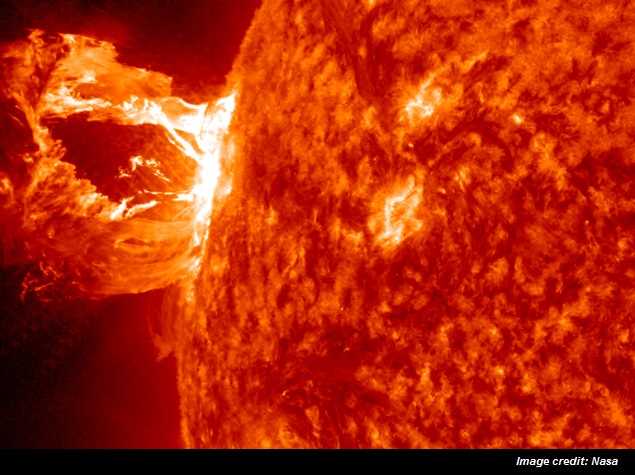- Home
- Science
- Science News
- Nasa Says Massive Solar Flare Can Disrupt Communications, GPS Signals
Nasa Says Massive Solar Flare Can Disrupt Communications, GPS Signals

The sun is going through an 11-year cycle which at its peak is called a solar storm maximum.
"These solar flares are powerful bursts of radiation that can disturb the atmosphere in the layer where GPS and communications signals travel," said Nasa spokesperson Karen Fox.
Some of the flares spewing from the sun's surface can be at least 14 times the size of Earth.
The flares from sunspot AR 2151 were detected by Nasa's Solar Dynamics Observatory and Solar Helospheric Observatory (SOHO), a joint Nasa and European Space Agency activity.
Even as the intensity of flares from the sun begins to diminish, they could hit Earth well into subsequent years, until the cycle reaches a so-called solar-storm minimum, a report on wnd.com website said.
In response to defence-system vulnerabilities to an electromagnetic pulse, or EMP, strike, the US Defence Department has decided to harden all its "ground, air, maritime, and space-based platforms, electronic and electrical systems, subsystems and equipment".
Get your daily dose of tech news, reviews, and insights, in under 80 characters on Gadgets 360 Turbo. Connect with fellow tech lovers on our Forum. Follow us on X, Facebook, WhatsApp, Threads and Google News for instant updates. Catch all the action on our YouTube channel.
Related Stories
- Samsung Galaxy Unpacked 2026
- iPhone 17 Pro Max
- ChatGPT
- iOS 26
- Laptop Under 50000
- Smartwatch Under 10000
- Apple Vision Pro
- Oneplus 12
- OnePlus Nord CE 3 Lite 5G
- iPhone 13
- Xiaomi 14 Pro
- Oppo Find N3
- Tecno Spark Go (2023)
- Realme V30
- Best Phones Under 25000
- Samsung Galaxy S24 Series
- Cryptocurrency
- iQoo 12
- Samsung Galaxy S24 Ultra
- Giottus
- Samsung Galaxy Z Flip 5
- Apple 'Scary Fast'
- Housefull 5
- GoPro Hero 12 Black Review
- Invincible Season 2
- JioGlass
- HD Ready TV
- Latest Mobile Phones
- Compare Phones
- Tecno Pova Curve 2 5G
- Lava Yuva Star 3
- Honor X6d
- OPPO K14x 5G
- Samsung Galaxy F70e 5G
- iQOO 15 Ultra
- OPPO A6v 5G
- OPPO A6i+ 5G
- Asus Vivobook 16 (M1605NAQ)
- Asus Vivobook 15 (2026)
- Brave Ark 2-in-1
- Black Shark Gaming Tablet
- boAt Chrome Iris
- HMD Watch P1
- Haier H5E Series
- Acerpure Nitro Z Series 100-inch QLED TV
- Asus ROG Ally
- Nintendo Switch Lite
- Haier 1.6 Ton 5 Star Inverter Split AC (HSU19G-MZAID5BN-INV)
- Haier 1.6 Ton 5 Star Inverter Split AC (HSU19G-MZAIM5BN-INV)







![[Partner Content] OPPO Reno15 Series: AI Portrait Camera, Popout and First Compact Reno](https://www.gadgets360.com/static/mobile/images/spacer.png)









